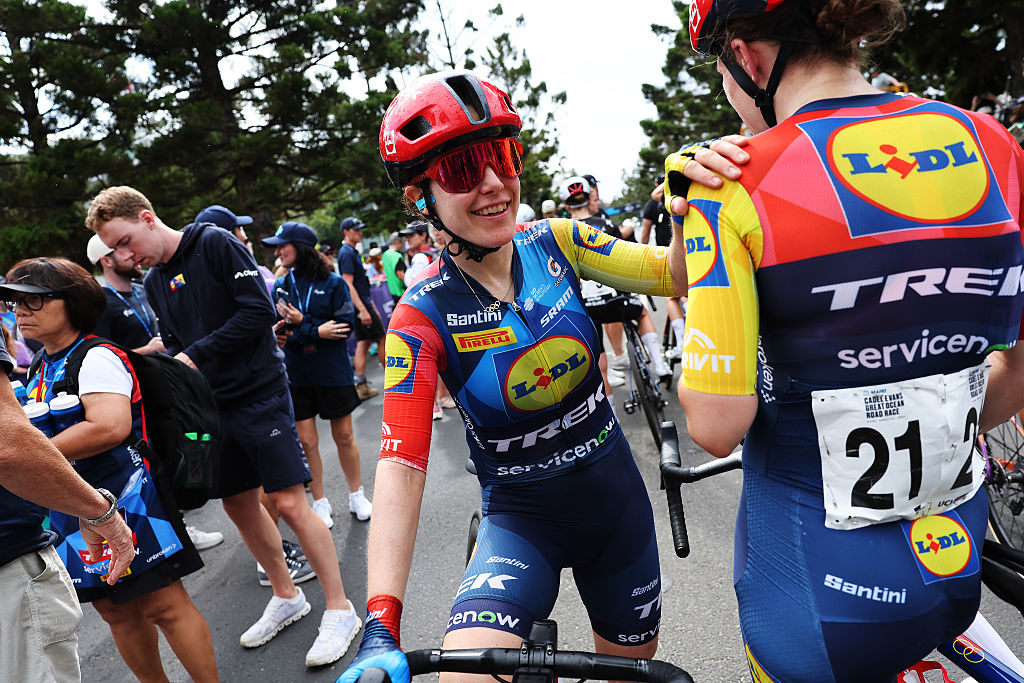Brendan Quirk takes over as CEO of USA Cycling
Former Competitive Cyclist owner and Rapha president succeeds Rob DeMartini

The latest race content, interviews, features, reviews and expert buying guides, direct to your inbox!
You are now subscribed
Your newsletter sign-up was successful
USA Cycling has named Brendan Quirk as its new CEO to succeed Rob DeMartini, who unexpectedly resigned this week.
"It was as much of a surprise to me as anyone else when he made the decision to step down," Quirk told Cyclingnews on Friday. "The board decided the best way forward was to extend an offer to me. I was so close in the organisation and so actively involved, it seemed like a really smooth and straightforward transition."
Quirk just succeeded Bob Stapleton as Chairperson of the Board of Directors in October after serving as vice-chair, and now takes the reins of a federation trying to climb out of years of declining membership.
Unlike DeMartini, who came to the federation from New Balance and was intended to give a fresh perspective to USA Cycling, Quirk is an industry insider. The 50-year-old has been a racer for decades and co-founded Competitive Cyclist.
He's since been an executive vice president at Backcountry.com after it bought Competitive Cyclist, and later the North American president of Rapha. Hailing from Bentonville, Arkansas, he has been involved with building up the cycling industry and cycling tourism in Northwest.
DeMartini's time as CEO was marred by the COVID-19 pandemic, which scuttled plans to grow membership as races across the country were cancelled. It led to deep budget cuts that impacted the high-performance programme responsible for building the Olympic team. One important job Quirk will have is rebuilding toward the Paris Olympics in 2024 and Los Angeles Games in 2028.
"We're fully committed to sports performance," Quirk told Cyclingnews before acknowledging the impact that the budget cuts had on USA Cycling's performance in Tokyo, where Team USA fell shy of their medal goal, bringing home one each gold, silver and bronze.
The latest race content, interviews, features, reviews and expert buying guides, direct to your inbox!
"We're the only cycling federation in the world that is not heavily funded by the government. Team GB gets a lot of money on an annual basis from the government and to my knowledge they didn't lose a penny due to Covid. We don't have that kind of luxury, and with all the unknowns around Covid, Rob had to make significant budget cuts because we wanted to survive to fight another day. That impacted all parts of the organisation including sports performance."
Amid the uncertainty of whether the Tokyo Games or any other races would even take place or if the team could travel, staff were furloughed and Quirk and DeMartini both admitted they did not ramp back up fast enough.
"The fog of war was in place and we were too slow in reinvesting in the sport performance programme," Quirk said. "It's not like you can put the money in today and the impact is felt tomorrow. It's a long lead time to see benefits... it takes a long time to put the component pieces together. Jim Miller and his staff and Team USA's athletes suffered because of that.
"It wasn't a lack of effort or talent, it was a skeleton staff and other challenges that put them on the back foot going into Tokyo."
Looking back at Tokyo, USA Cycling realised the need to "make a significant investment in the sports performance programme in order to bounce back and do a whole lot better in Paris, and a whole lot-lot better in Los Angeles in 2028," Quirk said.
"We're fortunate that we have a really strong foundation that believes in Team USA, and we also get really great support from the USOPC and we're grateful for that support. I think we are going to rapidly bounce back. When you look at the athletes coming through the system across all disciplines – between the investment, talent and coaching staff that Jim Miller is assembling, I think we're in an awesome position going into Paris."
Diversity and criticism
The resignation of DeMartini closely followed an outcry from the transgender community and allies after the anti-transgender "Save Women's Sport" organisation staged a demonstration at the cyclo-cross national championships in Illinois last weekend, and officials did nothing to stop them from heckling trans athletes who were competing.
DeMartini mishandled an outcry in April over anti-transgender legislation passed in Arkansas, where the UCI Cyclo-cross World Championships will be held in January, saying any boycott would be 'ceremonial', a comment Philippa York said was 'unacceptable'.
When asked about the incident with Save Women's Sport, Quirk gave a lengthy and typically CEO-like bullet list of all of USA Cycling's diversity initiatives but he also admitted that the demonstration was not handled adequately.
"We realized we don't have adequate policies in place to address protests and demonstrations at our events. The lack of a policy at USA Cycling is something we will address in the future. I feel like we're going in the right direction. Diversity for me as CEO is going to be an important part of our strategy."
USA Cycling held an industry-wide inclusion conference, helped to build a programme with EF to fund cycling programmes at Historically Black and Tribal colleges and universities, the Let's Ride programme to get disadvantaged youths on bikes.
However, this week Liv Racing's Ayesha McGowan announced she had stepped down from USA Cycling's DEI committee, saying it has been "a work in progress that feels slower moving than molasses" and "they keep adding more and more programs and stretching staff thinner while repeating the same mistakes they can't seem to learn from".
When asked about McGowan's comments, Quirk disagreed with her assessment and said he feels that USA Cycling and the bike industry "have made great progress".
"Anyone who expects us to get it right in the first year of focused efforts, that's a tall order. There was a lot of coordination and broad-based engagement with lots of communities to get this right. Naturally, we're not going to get it perfect, but that's not going to deter us. Those efforts are going to continue into next year."
Membership
DeMartini's main objective was to reverse declining membership at USA Cycling and to give non-racers a reason to sign up. The pandemic did nothing to help the trend, but Quirk sees ample opportunity in the explosion of interest in cycling that came along with COVID-19.
"It's an amazing moment to be involved in cycling because of the growth in the activity. We're hopeful we'll figure out a path forward to be more relevant," Quirk said.
"Racing has been in decline, but it's incredible what we've seen in increases in cycling generally. We need to create a better experience for current membership, and provide more value to riders, club managers and event organisers more compelling value for being associated with USAC. That's a big priority, we really care for the existing members.
"We also need to be increasingly relevant to a much more dynamic cycling event environment than we've ever had. We have to serve this new generation of cyclists.
"We have one fascinating ride membership rolling out in 2022. It's a lot less expensive than any of our race memberships. We're partnering with a company called Spot to give riders supplemental insurance anytime they're on a bike."
Without national healthcare, even Americans with private health insurance are paying higher premiums and seeing increased deductibles – a threshold of out-of-pocket payments for care before insurance will pay for any of it.
"Most people have high-deductible health insurance plans, so if you break your collarbone it could cost $8,000 if you haven't met your deductible. This [Spot] insurance covers that gap from $0-25,000.
"It's a big step forward for us to provide tangible value to people who ride but don't race. That's just the first step forward in a much more built-out reason for people to become members."

Laura Weislo has been with Cyclingnews since 2006 after making a switch from a career in science. As Managing Editor, she coordinates coverage for North American events and global news. As former elite-level road racer who dabbled in cyclo-cross and track, Laura has a passion for all three disciplines. When not working she likes to go camping and explore lesser traveled roads, paths and gravel tracks. Laura specialises in covering doping, anti-doping, UCI governance and performing data analysis.
